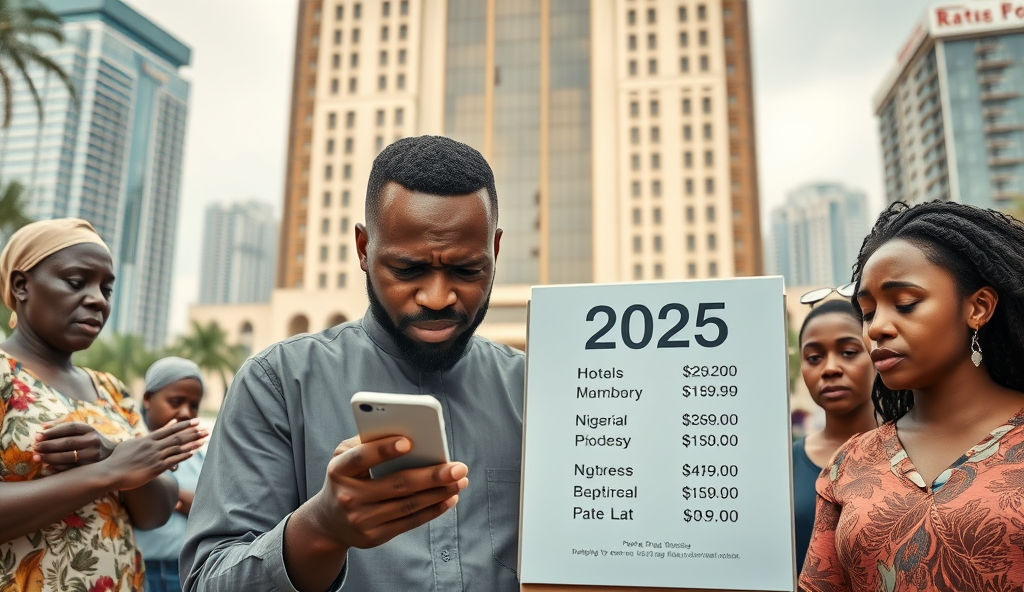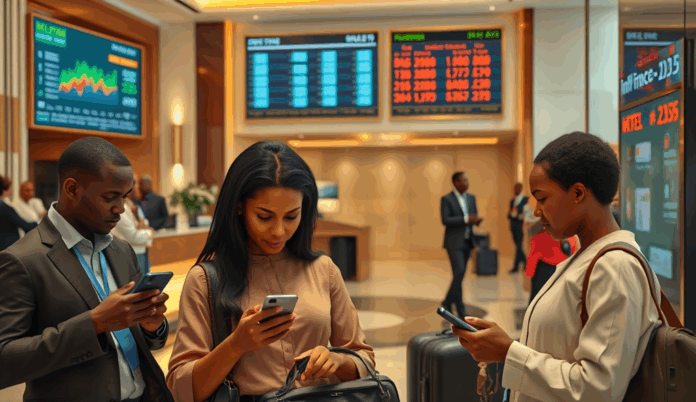Introduction to Hotel Price Inflation in Nigeria
Hotel price inflation in Nigeria has surged by 22% year-on-year, significantly impacting travel budgets for both domestic and international tourists. Major cities like Lagos and Abuja have seen the steepest rises, with luxury hotel rates climbing above ₦150,000 per night due to rising operational costs and high demand.
This trend is reshaping travel plans, forcing tourists to either adjust budgets or seek alternative accommodations such as guesthouses or short-term rentals. Seasonal fluctuations further exacerbate costs, with peak periods like December seeing prices double in popular destinations like Calabar and Port Harcourt.
Understanding these pricing dynamics is crucial for travelers aiming to optimize expenses without compromising comfort. The next section will explore the key drivers behind Nigeria’s hotel price inflation, from currency devaluation to supply chain disruptions.
Key Statistics

Understanding the Causes of Hotel Price Inflation in Nigeria
Hotel price inflation in Nigeria has surged by 22% year-on-year significantly impacting travel budgets for both domestic and international tourists.
The 22% surge in Nigeria’s hotel prices stems from multiple interconnected factors, with currency devaluation being the most significant as the naira’s decline against the dollar has inflated import costs for essentials like linens and maintenance equipment. Rising operational expenses, including diesel prices exceeding ₦1,200 per liter and increased staff wages, further squeeze profit margins, forcing hotels to adjust rates.
Supply chain disruptions from port congestion and customs delays have escalated costs for imported goods, while limited local alternatives sustain dependency on expensive foreign supplies. High demand in commercial hubs like Lagos and Abuja exacerbates the situation, with occupancy rates above 80% during peak seasons enabling premium pricing.
These inflationary pressures are compounded by Nigeria’s broader economic challenges, including inflation rates surpassing 30% in 2024. The next section will analyze how these factors manifest differently across major cities, offering travelers insights into regional pricing variations.
Current Trends in Hotel Prices Across Major Nigerian Cities
The 22% surge in Nigeria’s hotel prices stems from multiple interconnected factors with currency devaluation being the most significant as the naira’s decline against the dollar has inflated import costs for essentials like linens and maintenance equipment.
Lagos leads with the steepest increases, where luxury hotels now average ₦120,000 nightly, a 35% jump from 2023, driven by corporate demand and scarce premium inventory. Abuja follows closely with 28% hikes as government activities and diplomatic visits sustain high occupancy rates year-round.
Port Harcourt and Kano show more moderate 15-18% rises, reflecting their reliance on oil sector travelers and regional trade respectively. Even mid-range hotels in these cities now exceed ₦60,000 nightly during conferences or religious festivals.
Coastal destinations like Calabar maintain lower but growing rates (12% increase), benefiting from domestic tourism while facing similar operational cost pressures. These disparities highlight how Nigeria’s hotel price inflation manifests unevenly across regions, directly impacting travel budgets differently.
Impact of Hotel Price Inflation on Travel Budgets
Lagos leads with the steepest increases where luxury hotels now average ₦120000 nightly a 35% jump from 2023 driven by corporate demand and scarce premium inventory.
The rising hotel rates in Nigeria are forcing travelers to allocate 25-40% more for accommodation compared to 2023, with business travelers in Lagos and Abuja facing the sharpest budget adjustments. Families visiting during peak seasons now spend over ₦180,000 for three-night stays in mid-range hotels, nearly double last year’s rates in some cities.
Increased accommodation costs in Nigeria particularly affect domestic tourists, as leisure trips now require careful planning around religious festivals or conferences when prices spike. Coastal destinations like Calabar remain relatively affordable but still demand 12-15% higher budgets than pre-inflation periods.
These budget pressures are reshaping travel patterns, with many Nigerians opting for shorter stays or alternative lodging—a trend we’ll explore further in strategies to mitigate hotel price inflation. The disparities between cities mean travelers must research location-specific rates thoroughly before finalizing itineraries.
Strategies to Mitigate the Effects of Hotel Price Inflation
Travelers can offset rising hotel rates in Nigeria by booking accommodations 3-6 months in advance particularly for peak periods like December holidays or major conferences when prices surge by 30-50%.
Travelers can offset rising hotel rates in Nigeria by booking accommodations 3-6 months in advance, particularly for peak periods like December holidays or major conferences when prices surge by 30-50%. Flexible travelers should consider mid-week stays, as Lagos hotels often offer 15-20% discounts from Tuesday to Thursday compared to weekend rates.
Leveraging loyalty programs with Nigerian hotel chains like Transcorp or Eko Hotels can yield 10-15% savings, while corporate travelers should negotiate extended-stay packages for weekly or monthly discounts. Domestic tourists can explore emerging destinations like Jos or Abeokuta, where rates remain 25% lower than in Lagos or Abuja.
Bundling flights and hotels through local travel agencies sometimes provides better value, with some Lagos-based operators offering package deals at 2023 price points. These tactical approaches create breathing room in travel budgets before we examine alternative accommodation options that further reduce expenses.
Alternative Accommodation Options for Budget-Conscious Travelers
For travelers facing rising hotel rates in Nigeria serviced apartments in cities like Lagos and Abuja offer 20-30% savings compared to traditional hotels with added perks like kitchenettes for meal prep.
For travelers facing rising hotel rates in Nigeria, serviced apartments in cities like Lagos and Abuja offer 20-30% savings compared to traditional hotels, with added perks like kitchenettes for meal prep. Platforms like Spleet and RentSmallSmall provide verified short-term rentals, often at 2023 price points, particularly in emerging neighborhoods like Lekki Phase 2 or Abuja’s Jabi district.
Guesthouses and homestays remain underutilized gems, with options in Calabar or Enugu costing 40% less than hotels while offering authentic cultural experiences. Religious retreat centers in cities like Ibadan also provide clean, affordable lodging at ₦5,000-₦10,000 nightly, ideal for pilgrims or budget backpackers.
These alternatives complement earlier strategies like advance bookings and loyalty programs, setting the stage for exploring additional tips to secure affordable hotels in Nigeria.
Tips for Booking Affordable Hotels in Nigeria
To maximize savings, consider booking during Nigeria’s off-peak seasons (April-June and September-October) when hotel rates drop by 15-25%, especially in business hubs like Lagos and Abuja. Platforms like Jumia Travel and Hotels.ng frequently offer flash sales, with discounts of up to 30% for early birds or last-minute bookings.
Leverage price-comparison tools such as Trivago or Kayak to identify the best deals across Nigerian cities, as rates can vary significantly between Ikeja and Victoria Island in Lagos. Bundling flights and accommodations through local travel agencies like Wakanow can also yield 10-15% savings compared to standalone bookings.
For extended stays, negotiate directly with hotels for weekly or monthly rates, which often undercut daily prices by 20%, particularly in mid-range properties in Port Harcourt or Kano. These strategies, combined with earlier tips on loyalty programs and alternative accommodations, can help travelers navigate rising hotel rates effectively.
Conclusion: Navigating Hotel Price Inflation for a Hassle-Free Trip
Understanding Nigeria’s hotel price inflation trends, from Lagos’s 15% annual rate surge to Abuja’s seasonal spikes, empowers travelers to budget strategically. By leveraging early bookings and off-peak travel periods, tourists can mitigate the impact of rising accommodation costs in Nigeria while still enjoying quality stays.
Local insights, like prioritizing guesthouses in Enugu or serviced apartments in Port Harcourt, offer affordable alternatives to traditional hotels. Combining these strategies with loyalty programs or negotiated corporate rates can further ease budget pressures caused by Nigeria’s hospitality sector pricing shifts.
As Nigeria’s tourism landscape evolves, staying informed about hotel industry price trends ensures smarter travel planning. Proactive measures, from comparing city-specific rates to exploring bundled deals, transform inflation challenges into manageable expenses for a seamless Nigerian experience.
Frequently Asked Questions
How can I find affordable hotels in Lagos during peak season?
Book at least 3-6 months in advance and use platforms like Jumia Travel for flash sales offering up to 30% discounts.
Are there alternative accommodations in Abuja that are cheaper than hotels?
Yes consider serviced apartments or guesthouses through platforms like Spleet which can save you 20-30% compared to hotels.
What is the best time to visit Calabar to avoid high hotel prices?
Plan your trip during off-peak seasons like April-June when rates drop by 15-25% compared to December peaks.
Can I negotiate hotel rates for extended stays in Nigeria?
Yes many mid-range hotels in cities like Port Harcourt offer 20% discounts for weekly or monthly bookings when negotiated directly.
How does currency devaluation affect hotel prices in Nigeria?
The naira's decline increases import costs for hotels leading to higher rates; use loyalty programs like Transcorp's to offset some of these costs.


